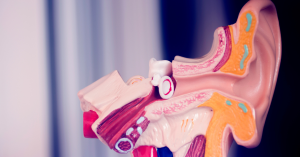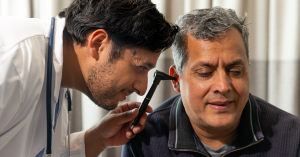If you’ve ever had that uncomfortable, plugged-up feeling in your ear—like you’re wearing invisible earmuffs—you’re not alone. A clogged ear can make everything sound muffled, throw off your balance, and leave you wondering if you should wait it out or call a doctor. The good news? In many cases, that stuffed-up ear will unclog itself—but not always.
Clogged ears are incredibly common and often caused by simple, temporary issues like changes in air pressure, mild congestion, or earwax buildup. But sometimes, they signal something more serious—especially if pain, hearing loss, or other strange symptoms are involved.
So, how can you tell the difference?
In this article, we’ll help you recognize 8 signs your ear is likely to unclog on its own, and 8 signs it won’t, so you can stop worrying and take the right next step. Whether you’re dealing with post-cold pressure, airplane ear, or something more persistent, this guide will help you understand what your body is trying to tell you—and when it’s time to see a professional.
What Does It Mean When Your Ear Feels Clogged?
That full, blocked, or muffled sensation in your ear—commonly described as a “clogged ear”—can be caused by several different issues. While the feeling might be the same, the underlying cause plays a major role in whether or not your ear will unclog by itself.
Common Causes of a Clogged Ear
Here are the most frequent culprits behind that plugged-up feeling:
- Earwax Buildup: Earwax helps protect your ear canal, but when it builds up or becomes impacted, it can block sound and create pressure. Mild wax buildup may clear on its own, but impaction often needs removal by a professional.
- Fluid from a Cold or Allergies: Sinus congestion can cause fluid to build up in the middle ear, leading to a sensation of fullness and reduced hearing. This often clears once your sinuses recover, but it can linger or become infected.
- Eustachian Tube Dysfunction: The Eustachian tubes connect your middle ears to the back of your throat and help equalize pressure. If they become blocked—due to a cold, allergies, or changes in altitude—you may feel ear pressure or popping. This is one of the most common causes of temporary ear clogging.
- Barotrauma (Air Pressure Changes): If you’ve recently flown on a plane, gone scuba diving, or driven through mountains, your ears may feel clogged due to pressure changes. This usually improves with time or pressure-equalizing techniques like yawning or swallowing.
- Outer or Middle Ear Infections: Infections can cause swelling, fluid buildup, or pus that blocks the ear canal or middle ear space. These typically come with pain, and won’t resolve on their own without treatment.
- Water Trapped in the Ear: After swimming or showering, water can become trapped in the ear canal, leading to a clogged sensation. This may resolve naturally, but if it persists, it can lead to an infection (swimmer’s ear).
Why the Cause Matters
Understanding what’s behind your ear clogging is the first step to deciding whether to wait it out—or seek help. Some causes will clear on their own with time, while others may need intervention.
In the next two sections, we’ll help you spot the difference with 8 signs your ear is likely to unclog naturally, and 8 signs it probably won’t.
8 Signs Your Ear Will Likely Unclog on Its Own
Not every clogged ear needs medical treatment. In fact, many cases resolve naturally—especially when they’re related to pressure changes, mild congestion, or temporary dysfunction in the Eustachian tubes. Here are 8 encouraging signs that your ear is likely to clear up without intervention:
1. You Recently Flew or Changed Altitude
If your ear clogged after a flight, a road trip through the mountains, or diving underwater, chances are it’s due to barometric pressure changes. In most cases, this will resolve on its own within a day or two.
2. Mild Pressure That Improves Over the Day
A gentle, stuffy sensation that comes and goes or feels better as the day progresses often points to minor fluid buildup or Eustachian tube dysfunction. This type of pressure often resolves without treatment—especially if it started after a cold.
3. You Can “Pop” Your Ear With Yawning or Swallowing
If yawning, chewing gum, or swallowing helps relieve the pressure temporarily, your Eustachian tubes are still functioning and trying to clear themselves. This is a good sign that your ear is adjusting naturally.
4. It Started After a Cold or Allergies
Clogged ears caused by congestion or sinus inflammation typically improve as your cold or allergy symptoms fade. If your ear has been clogged for less than a week following an illness, it’s likely to improve on its own.
5. There’s No Pain, Discharge, or Dizziness
A clogged ear that’s simply muffled or full—but not painful, leaking, or affecting your balance—is more likely to be minor and temporary. The absence of red flags is a good sign.
6. Your Hearing Is Just Slightly Muffled
If sound is just a bit dull or distant, but you can still hear reasonably well, this may be due to minor wax buildup, mild congestion, or Eustachian tube dysfunction—all of which often resolve without medical help.
7. The Feeling Changes When You Move Your Head
If the clogged sensation shifts when you tilt your head or lie down, it could be fluid or minor wax movement—both of which may clear on their own as your body reabsorbs the fluid or the wax shifts naturally.
8. Symptoms Are Improving
Even if your ear still feels a bit clogged, gradual improvement over a few days is a great sign that your body is resolving the issue. Give it a little more time before jumping to treatment.
8 Signs Your Ear Won’t Unclog Without Help
While many clogged ears clear on their own, certain symptoms suggest that your ear won’t improve without professional evaluation and treatment. Here are 8 warning signs that it’s time to take action:
1. Severe or Worsening Pain
If you’re experiencing sharp, throbbing, or persistent ear pain—especially if it gets worse when you lie down or touch the ear—it could indicate an ear infection or other issue that needs medical attention. Pain is rarely a sign of a self-resolving condition.
2. Fluid or Pus Is Draining From the Ear
Any fluid discharge—especially if it’s yellow, green, or bloody—is a strong sign of infection or a perforated eardrum. This is not something that will heal on its own and should be checked by a healthcare provider.
3. No Improvement After Several Days
If your ear has been clogged for more than a week with no change or it seems to be getting worse, it’s likely time for an exam. Prolonged blockage could be due to impacted wax, fluid behind the eardrum, or a more serious condition.
4. Sudden or Complete Hearing Loss
A sudden drop in hearing or the complete inability to hear in one ear should never be ignored. This could be a sign of sudden sensorineural hearing loss (SSHL), a medical emergency that requires immediate treatment to prevent permanent damage.
5. Dizziness or Balance Problems
If you’re experiencing clogged ears alongside dizziness, spinning sensations, or feeling off balance, it could point to an inner ear issue, such as labyrinthitis or vestibular neuritis. These conditions won’t clear up on their own and often need medication.
6. Persistent Ringing or Buzzing (Tinnitus)
Tinnitus that begins suddenly in one ear—especially when paired with hearing loss—may be a sign of nerve damage or another underlying issue. Don’t wait for it to resolve on its own; seek evaluation.
7. Home Remedies Aren’t Working
If you’ve tried gentle methods like yawning, swallowing, warm compresses, or over-the-counter wax drops without any relief, you may need professional ear cleaning or further testing to get to the root of the problem.
8. You Frequently Wear Earplugs, Hearing Aids, or Earbuds
Regular use of in-ear devices can lead to wax compaction or irritation. If your ear feels clogged and you wear something in your ear often, it’s best to have it evaluated to avoid worsening the issue.
Home Remedies That May Help If It’s Safe
If your clogged ear isn’t accompanied by pain, discharge, dizziness, or hearing loss, you may be able to manage it at home with a few safe, simple remedies. These methods are best suited for minor issues like mild earwax buildup, sinus-related pressure, or fluid from a recent cold.
⚠️ Important: Never insert anything into your ear canal—including cotton swabs, fingers, or candles. Doing so can worsen the problem or damage your eardrum.
1. Swallowing, Yawning, or Chewing Gum
These natural movements help open the Eustachian tubes, which equalize pressure between your middle ear and throat. They’re especially useful after flying or driving through altitude changes.
2. Valsalva Maneuver
Gently pinch your nose shut, close your mouth, and try to blow out through your nose without letting air escape. This can help “pop” your ears and equalize pressure. Don’t blow too hard—doing so could harm your eardrum.
3. Warm Compress or Steam
Applying a warm cloth to the side of your face or taking a steamy shower can help loosen mucus and open up blocked Eustachian tubes. This is especially helpful if you’re recovering from a cold or sinus infection.
4. Over-the-Counter Decongestants
If congestion from allergies or a cold is to blame, oral decongestants (like pseudoephedrine) or nasal sprays (like oxymetazoline) may reduce swelling and help your ear drain. Use nasal sprays only as directed—usually no more than 3 consecutive days.
5. Ear Drops for Wax Buildup
For mild wax buildup, you can use hydrogen peroxide-based ear drops or mineral oil to soften the wax. These are available at most pharmacies. If the wax doesn’t drain within a few days, consult a doctor—don’t try to remove it yourself.
6. Tilt and Drain for Water in the Ear
If water is trapped in your ear, try tilting your head sideways, hopping gently, or pulling on your earlobe to create a path for the water to escape. A hair dryer on the lowest setting, held several inches away, can also help evaporate moisture.
When to See a Doctor (And What to Expect)
While many clogged ears improve with time and simple remedies, there are situations where medical care is essential. If your symptoms aren’t improving—or if you’ve noticed any warning signs—it’s time to consult a healthcare provider.
When to Seek Medical Help
You should make an appointment if:
- Your ear has been clogged for more than a week
- You have pain, fluid drainage, or hearing loss
- You feel dizzy or off-balance
- Tinnitus (ringing) has started suddenly
- Home treatments haven’t helped
These could be signs of a more serious issue like an ear infection, impacted earwax, or even inner ear or nerve involvement.
Who to See
- Primary Care Physician (PCP): A good first step. They can examine your ears, prescribe medications if needed, and refer you if necessary.
- ENT Specialist (Otolaryngologist): For persistent, complex, or recurring issues, an ENT has the tools and expertise to treat conditions like chronic infections, Eustachian tube dysfunction, or growths.
- Audiologist: If hearing loss is a concern, audiologists perform specialized hearing tests and can help determine the next steps for treatment or hearing aid support.
What Happens During the Visit
- Ear Exam: The doctor will use an otoscope to inspect your ear canal and eardrum for wax buildup, fluid, redness, or infection.
- Hearing Test (if needed): If your hearing is affected, a simple audiometric test may be performed to assess the severity and type of hearing loss.
- Treatment Plan: Depending on the cause, treatment might include:
- Earwax removal (manual, irrigation, or suction)
- Prescription drops or antibiotics for infections
- Referrals for advanced care or imaging if something more serious is suspected
Most cases of clogged ears are treatable—and the earlier you address them, the better your chances of a quick and full recovery.
Conclusion
Clogged ears are a common—and often temporary—nuisance that can leave you feeling frustrated, off-balance, and unsure of what to do next. Fortunately, in many cases, your ear will unclog on its own, especially if the cause is something minor like a cold, altitude changes, or mild congestion.
Still, it’s important to know when not to wait. Pain, discharge, persistent symptoms, or sudden hearing loss could be signs that something more serious is going on—and in those cases, early treatment is key to avoiding complications.
The good news? Whether your ear clears up naturally or needs a little help from your doctor, most people regain full hearing and relief quickly once the root cause is addressed. So don’t panic—just stay informed, listen to your body, and take action when the signs point to something more than a simple ear clog.
FAQ
How long does it take for a clogged ear to unclog on its own?
If the cause is minor—like altitude changes, fluid from a cold, or mild congestion—your ear may clear up in a few hours to a few days. However, if it lasts more than a week or is getting worse, it’s time to see a doctor.
Can I use cotton swabs to unclog my ear?
No. Cotton swabs can push wax deeper into the ear canal or even damage the eardrum. It’s best to let earwax exit naturally or use safe over-the-counter drops if recommended.
What’s the fastest way to relieve a clogged ear from a cold or sinus issue?
Try swallowing, yawning, or using a nasal decongestant. A warm compress or steam inhalation can also help relieve sinus pressure and allow the Eustachian tubes to drain more effectively.
Is it normal for one ear to feel more clogged than the other?
Yes. One-sided clogging is common, especially after flying, swimming, or during a cold. However, if only one ear remains clogged or painful, it’s important to have it checked out.
Will a clogged ear affect my hearing permanently?
Usually not—most causes are temporary and reversible. However, if hearing doesn’t return after a few days, or if it’s associated with pain or other symptoms, you should seek medical advice to rule out long-term damage.
“This article is for informational purposes only and is not a substitute for professional medical advice, diagnosis, or treatment. If you are concerned about your hearing or ear health, please consult a qualified healthcare provider.”






